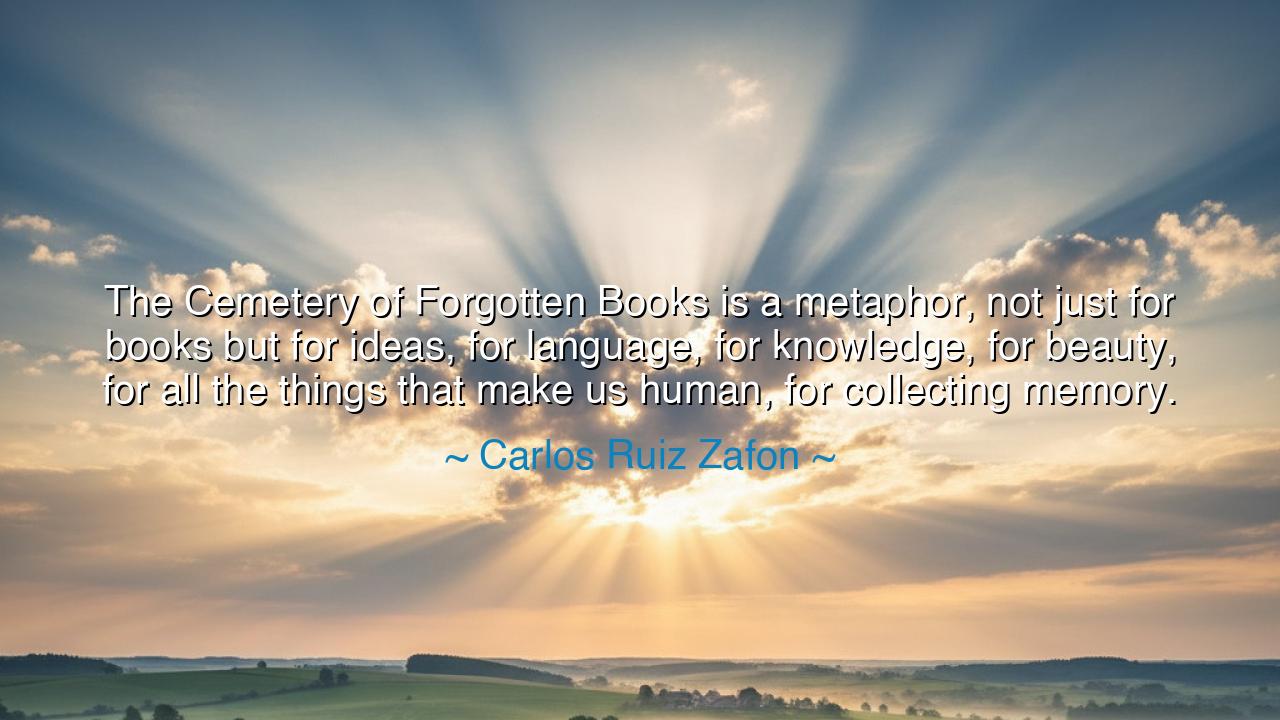
The Cemetery of Forgotten Books is a metaphor, not just for books
The Cemetery of Forgotten Books is a metaphor, not just for books but for ideas, for language, for knowledge, for beauty, for all the things that make us human, for collecting memory.






The words of Carlos Ruiz Zafón—“The Cemetery of Forgotten Books is a metaphor, not just for books but for ideas, for language, for knowledge, for beauty, for all the things that make us human, for collecting memory.”—are a hymn to the sacredness of memory and the fragile treasures of human culture. Spoken by the master storyteller who gave us The Shadow of the Wind, they carry the weight of centuries of creation, of voices rising from dust and ink, of civilizations remembered only because someone chose to write, to preserve, to tell. His vision of a cemetery of forgotten books is not a place of sorrow, but of awe, for it is the resting place of all that humanity has loved, thought, and dreamed.
To say that the cemetery is a metaphor is to remind us that books are more than paper and ink. Within their covers lie ideas that can outlast empires, languages that breathe the soul of a people, knowledge that lights the mind, and beauty that stirs the heart. A book forgotten is not merely an object neglected—it is a fragment of humanity at risk of vanishing. Zafón’s vision is thus a warning and a plea: do not let what makes us human slip into oblivion. For when memory is lost, the future grows barren, stripped of roots.
The ancients knew this truth. When the Library of Alexandria burned, countless works of science, philosophy, and art perished. Civilizations advanced by centuries of thought were set back by centuries of loss. That fire was no mere accident—it was the death of memory, the silencing of voices that might have guided us even now. Zafón’s cemetery is the echo of that tragedy, a reminder that forgetting is as dangerous as destruction, and that the preservation of knowledge is a sacred duty.
Yet his words are not only about books, but about what makes us human. Ideas, language, memory, and beauty are the soul of our species. They are what distinguish us from beasts, what lift us beyond mere survival. The cemetery gathers not bones, but dreams—artworks never finished, songs unsung, stories unread. Each forgotten piece diminishes us, while each preserved fragment strengthens our humanity. In this way, Zafón does not simply mourn the lost; he exhorts us to remember, to protect, to honor.
Consider the example of World War II, when Nazi forces sought not only to conquer lands but to burn books, to erase the memory of peoples. Yet in secret, men and women hid volumes in attics, smuggled manuscripts across borders, and risked their lives so that language and knowledge might survive. Their courage saved fragments of memory that could have been forever lost. They understood what Zafón teaches: to preserve memory is to preserve humanity itself. Without our stories, we cease to know who we are.
The lesson for us, then, is to live as guardians of memory. Read not only for pleasure but for preservation. Share the stories of your ancestors. Speak the languages of your forebears. Protect art, beauty, and knowledge against neglect, indifference, or destruction. Each act of remembrance defies the graveyard of forgetting. Each time we recall a story, revive an idea, or pass on wisdom, we breathe life into the cemetery, turning it from a place of silence into a chorus of voices that will never fade.
So, O listener, take Zafón’s vision to heart. Do not let the treasures of humanity be buried without a keeper. Be a guardian of forgotten books, forgotten songs, forgotten histories. Carry them forward, so that those who come after you may inherit not emptiness but abundance. For the Cemetery of Forgotten Books is not only in Barcelona, nor only in imagination—it is in every library, every shelf, every memory we choose to keep alive. And in tending it, we preserve not only knowledge, but the very essence of what it means to be human.






AAdministratorAdministrator
Welcome, honored guests. Please leave a comment, we will respond soon